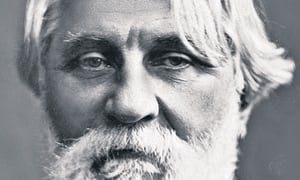 Since everything seems to be All Russia, All the Time, I’ve been thinking about Konstantin Levin, the most interesting character from Anna Karenina, and relatedly D.H. Lawrence, who did not care much for what Tolstoy was saying with Levin. But for some other probably suspicious reason was led back to Turgenev and Knock Knock Knock:
Since everything seems to be All Russia, All the Time, I’ve been thinking about Konstantin Levin, the most interesting character from Anna Karenina, and relatedly D.H. Lawrence, who did not care much for what Tolstoy was saying with Levin. But for some other probably suspicious reason was led back to Turgenev and Knock Knock Knock:
Two incidents that marked the first steps in his career did a great
deal to strengthen his “fatal” reputation. On the very first day after
receiving his commission–about the middle of March–he was walking
with other newly promoted officers in full dress uniform along the
embankment. The spring had come early that year, the Neva was melting;
the bigger blocks of ice had gone but the whole river was choked up
with a dense mass of thawing icicles. The young men were talking and
laughing … suddenly one of them stopped: he saw a little dog some
twenty paces from the bank on the slowly moving surface of the river.
Perched on a projecting piece of ice it was whining and trembling all
over. “It will be drowned,” said the officer through his teeth. The
dog was slowly being carried past one of the sloping gangways that led
down to the river. All at once Tyeglev without saying a word ran down
this gangway and over the thin ice, sinking in and leaping out again,
reached the dog, seized it by the scruff of the neck and getting
safely back to the bank, put it down on the pavement. The danger to
which Tyeglev had exposed himself was so great, his action was so
unexpected, that his companions were dumbfoundered–and only spoke all
at once, when he had called a cab to drive home: his uniform was wet
all over. In response to their exclamations, Tyeglev replied coolly
that there was no escaping one’s destiny–and told the cabman to drive
on.“You might at least take the dog with you as a souvenir,” cried one of
the officers. But Tyeglev merely waved his hand, and his comrades
looked at each other in silent amazement.The second incident occurred a few days later, at a card party at the
battery commander’s. Tyeglev sat in the corner and took no part in the
play. “Oh, if only I had a grandmother to tell me beforehand what
cards will win, as in Pushkin’s _Queen of Spades_,” cried a
lieutenant whose losses had nearly reached three thousand. Tyeglev
approached the table in silence, took up a pack, cut it, and saying
“the six of diamonds,” turned the pack up: the six of diamonds was the
bottom card. “The ace of clubs!” he said and cut again: the bottom
card turned out to be the ace of clubs. “The king of diamonds!” he
said for the third time in an angry whisper through his clenched
teeth–and he was right the third time, too … and he suddenly turned
crimson. He probably had not expected it himself. “A capital trick! Do
it again,” observed the commanding officer of the battery. “I don’t go
in for tricks,” Tyeglev answered drily and walked into the other room.
How it happened that he guessed the card right, I can’t pretend to
explain: but I saw it with my own eyes. Many of the players present
tried to do the same–and not one of them succeeded: one or two did
guess _one_ card but never two in succession. And Tyeglev had
guessed three! This incident strengthened still further his reputation
as a mysterious, fatal character. It has often occurred to me since
that if he had not succeeded in the trick with the cards, there is no
knowing what turn it would have taken and how he would have looked at
himself; but this unexpected success clinched the matter.
Honi soit, as Lev wrote.
